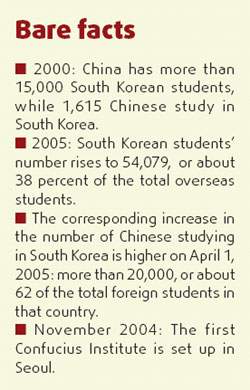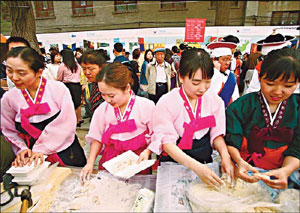Away from home but never alone
By Su Qiang (China Daily)Updated: 2007-04-10 07:11
Park Joeng-su is enjoying the spring sunshine on a bench on a university campus, looking back into his past and gazing into the future. Park first landed in Beijing from the Republic of Korea (or South Korea) six years ago. He was unable to speak a complete sentence in Putonghua then. Today, he not only speaks the language fluently, but is also expecting his doctorate's degree in international trade from one of the prestigious universities in China.
But those two are not the only things on top of Park's mind. "I'm thinking about setting up a company in Beijing to conduct trade between China and South Korea," says Park about his future plan.
|
Peking University's South Korean students prepare Korean dishes at the university's international culture festival in May, 2006. Ministry of Education statistics show China had 54,079 South Korean students in 2005, that is, about 38 percent of all overseas students. Dong Gang |
Park used to work for a trade company in Seoul, capital of South Korea, before coming to China. He was doing fine till the Asian financial crisis hit his company at the end of the last century, forcing it into bankruptcy. Thankfully, he had gathered enough experience to start life anew.
"After quitting my job, I knew I had to go somewhere for higher studies," he says. "I thought about the United States, but China was a big attraction, too. In the end China won." The close cultural links between China and South Korea played a big role in his decision, which his family approved of immediately.
"Since I'm the only son in my family, my parents and my sisters didn't want me to live oceans apart." He chose China over the other countries because "we are all Asians, and have a lot in common in culture. Hence, it's easier for me to get used to the environment in Beijing."
The scholar at the University of International Business and Economics (UIBE) who should get his PhD next month is among the thousands of South Koreans studying in China today. Cultural similarity, geographical proximity, relatively low tuition fees and the rapid economic growth have drawn students from neighboring countries to China, with South Korea contributing the highest number.
Ministry of Education statistics show China had 54,079 South Korean students in 2005, that is, about 38 percent of all overseas students. That country accounts for more than 2,000 students, or about 25 percent of the total from abroad, in Beijing Language and Culture University, the only university especially dedicated to teaching Chinese language and culture to overseas students.
Students from South Korea, however, do find some differences in college and university culture in China. "University students in South Korea are more active and have more interaction with their teachers," says Park. They don't hesitate to ask questions whenever they think a clarification or better explanation is needed.
"I have tried that in my university in Beijing, too, but on many occasions my teachers have said they'll discuss the matter with me after class," Park says.
But deputy director of the UIBE's School of International Education Han Weichun says: "We can meet the demand of the South Korean students interested in economics or of those who have family businesses and want to expand them to China." The university has 15,000 students on the campus, 2,000 of who are from abroad. And South Koreans comprise almost 40 percent of the total overseas students.
It's easier, too, Han says, for them to find a good job after graduation because there are many South Korean enterprises in China.
His views are echoed by Joen Da-won, a South Korean undergraduate student in UIBE. Joen sounds confident about finding a decent job, although she is still two years away from getting a bachelor's degree. The 20-year-old says many people from her country choose to work in China, and she has an advantage over them because of her fluent Chinese.
Joen's source of knowledge about China is different from Park's. She first learnt about China through martial arts movies. They aroused her interest in Chinese language and culture. "I loved watching Chinese martial arts movies with my father And Jet Li is still my favourite."
Joeng liked to read the Chinese subtitles while watching the films, trying to match the elegant martial arts movements with the seemingly complicated characters. As she watched more such movies, her urge to study Chinese grew, till three years ago, she quit senior high school to study the language. She studied pinyin before leaving her hometown of Busan for Beijing.
"My mother wanted me to study in China partly because she has some friends in Beijing," Joeng says. "Another reason was that compared to universities back home those in China are more affordable."
Joen spends about 65,000 yuan ($8,300) a year, 25,000 ($3,200) of which goes to pay her tuition fee. In contrast, the tuition fee in an average university in South Korea is about $9,000 a year, and living expenses can add up to another $10,000.
But choosing a university just for cost and convenience is not the only concern of overseas students, for the quality of education is still their top priority. Chinese universities do not advertise themselves like many of their Western counterparts. For them, word of mouth has been the best promotion and marketing tool.
 Also, senior students like Park act as a source of
information and help their compatriots to adjust to the new environment. "Each
time I return home in South Korea, I get calls or visits almost every day from
people seeking advice on which Chinese universities to go to," Park says.
Also, senior students like Park act as a source of
information and help their compatriots to adjust to the new environment. "Each
time I return home in South Korea, I get calls or visits almost every day from
people seeking advice on which Chinese universities to go to," Park says.
"They take me for an expert on everything about China. But I'm happy because I can provide them with first-hand information." Park's six years in China has also made him a trustworthy compatriot among South Koreans. He is the top adviser to a club of South Korean students in UIBE.
"Whenever they are in doubt about something or have trouble with their studies or in their daily life and want to talk to a South Korean, they come to me," Park says proudly.
To be honest, Park has helped a lot of his compatriots before earning their trust. Park has warmly welcomed new batches of students from South Korea for the past five years. He has helped them carry their luggage and has taken the role of interpreter for those who cannot speak Chinese.
Like many other foreign students, Park too feels very excited about the 2008 Beijing Olympic Games next year. Along with some of his compatriots, he has applied to become a volunteer for the Games and is awaiting the Olympic Organizing Committee's decision.
"I'm sure I'll be in Beijing then, but it would be better if I am part of the Games as a volunteer," he says optimistically. Hopefully, his and other overseas students' belief in China, its education, its economy and its people will bear fruit.
(China Daily 04/10/2007 page12)
|
||
|
||
|
|
